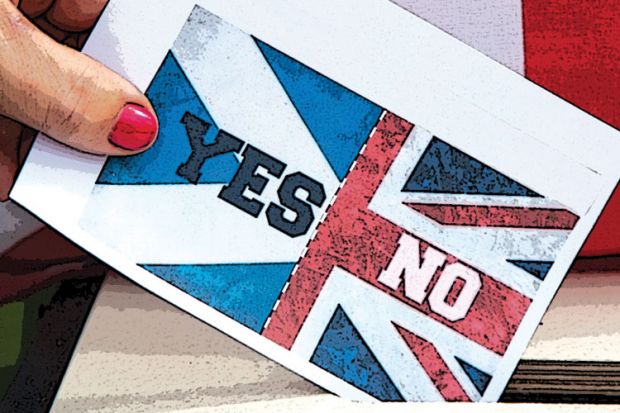The morning after the night before, after the Scottish referendum, I walked from my home in Portobello, an eastern coastal suburb of Edinburgh, into the city centre to gauge the mood of the day. As a Welshman working in a Scottish university, my experience of the campaign had been different from that of most.
That morning, I passed through familiar streets resplendent with blue and white “Yes” posters; saltires hung from windowsills or from homemade flag poles. Intermittently, the red and yellow of a “No” poster peeped through the mass of the blues and the whites. But the messages all seemed oddly muted after the vote. The streets were busy with people doing their day-to-day things. There was no partying, no jubilation, and people didn’t even seem to be speaking about what had happened.
I was one of the few to put up “No” posters in the window. Two years ago, however, it was all so different: I had decided that independence was the right route and that I would support the Scottish National Party in spite of being a Labour man. But I received no solid answers to the many questions that I posed about the nature and aftermath of independence and, slowly, I knew that until I had the answers, I could not glibly give my support to independence.
As I had long suspected, I was one of the silent majority. Within academia, “No” voters were more vocal; and the majority of my colleagues at the University of Edinburgh, it seemed, were voting to stay within the Union. There were common concerns about currency and pensions, and the role of universities within the independent state. Research funding, project grants and overseas relationships with current grant-holding institutions were hot topics.
The weeks leading up to the vote were strange and tense and occasionally ugly. The “Yes” campaigners were vociferous and impassioned and sometimes showed an aggression out of sync with everything I understand about Scotland. There were disquieting consequences to my decision to back Better Together. A colleague and friend, a member of Academics for Independence, accused me of being a Tory – that wound still cuts deep. The saltire, that special symbol of cultural and historical uniqueness, became hijacked as a nationalist totem and I was suddenly linked to the Union flag, a flag that has never held any meaning for me.
The referendum even brought my sense of Welshness into question (and I thought that was as unshakeable as the Rock of Ages). My friends in Wales, filtering their own aspirations of independence through the Scottish vote, I think, told me to “have some pride” and vote “Yes”.
While I am hopeful that “devolution max” will work, recent months have left me, and many others, reeling and exhausted. The truth is, I don’t think that anybody here saw the Scottish referendum result as a victory.
Should there be another referendum? Yes. I hope there will be. I hope that whoever runs the future equivalent of the “Yes” campaign will realise that the majority of people – and the Scottish academic community for certain – need hard facts and not flights of fancy. Yet in my heart of hearts (and perhaps my Welshness really is a part of this), I do think that Scotland can be a successful independent nation.
Register to continue
Why register?
- Registration is free and only takes a moment
- Once registered, you can read 3 articles a month
- Sign up for our newsletter
Subscribe
Or subscribe for unlimited access to:
- Unlimited access to news, views, insights & reviews
- Digital editions
- Digital access to THE’s university and college rankings analysis
Already registered or a current subscriber? Login

